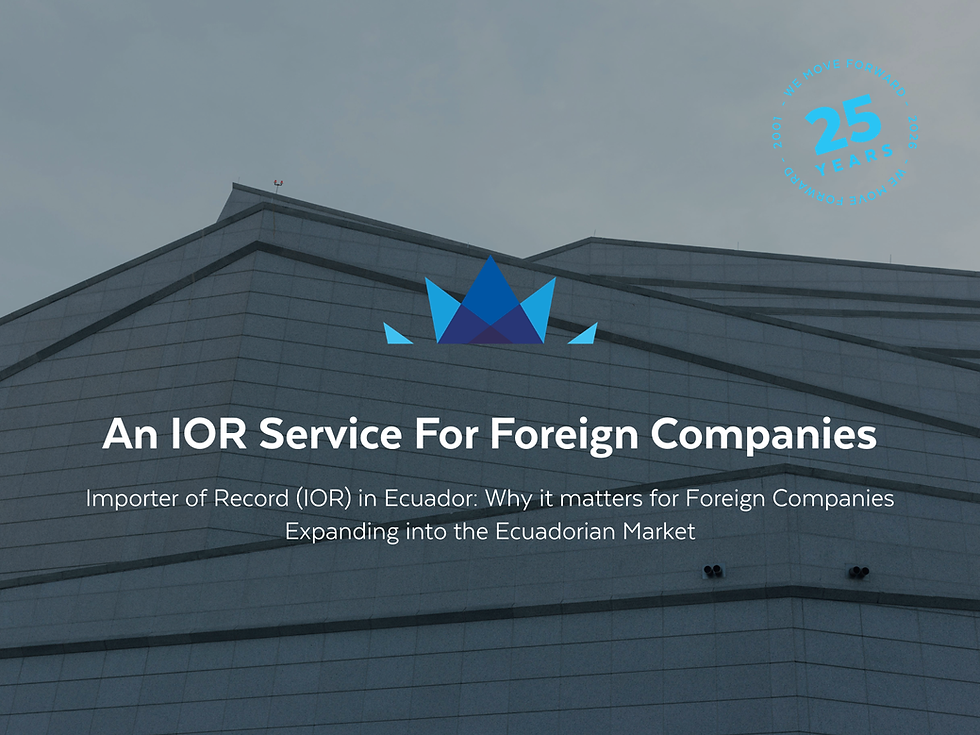Refrigerated Cargo Ecuador: Cold Chain Logistics for Export Success
- 17 sept 2025
- 3 Min. de lectura

Why Refrigerated Cargo Matters
In international trade, quality and freshness can mean the difference between success and loss. For countries like Ecuador—renowned worldwide for its bananas, flowers, seafood, and fresh produce—refrigerated cargo (also known as reefer logistics) is the backbone that keeps exports competitive.
But refrigerated transport is not just about food. Pharmaceuticals, chemicals, and even high-tech products depend on precise cold chain logistics to reach their destinations safely. Understanding how refrigerated cargo works, its challenges, and the opportunities it brings is key for businesses that want to grow in global markets.
What Is Refrigerated Cargo?
Refrigerated cargo refers to the transportation of goods that must remain within a strict temperature and humidity range throughout their journey. This is made possible through reefer containers—specialized shipping units equipped with:
Temperature control systems (from −60°C for deep freeze to +30°C for ambient control).
Humidity management to prevent spoilage or drying.
Ventilation systems to keep products fresh (e.g., fruits that release gases).
Remote Container Management (RCM) for real-time tracking and alerts.
Depending on the product, refrigerated cargo can be classified into:
Chilled cargo (1–7°C): fruits, vegetables, dairy.
Frozen cargo (−18°C or lower): seafood, meat, frozen foods.
Deep-frozen/cryogenic: specialized pharmaceuticals, biotech products.
Controlled atmosphere (CA): slows ripening and preserves quality of produce.
Ecuador’s Opportunity with Reefer Logistics
For Ecuador, refrigerated cargo is much more than a logistics solution—it’s a strategic advantage.
Banana exports: Ecuador is the world’s largest banana exporter. Without reefers, this industry would not exist at a global scale.
Cut flowers and roses: Timing and temperature make the difference between premium quality and rejected shipments.
Seafood (shrimp, tuna, tilapia): Requires strict frozen-chain management to meet EU, US, and Asian standards.
Exotic fruits (pitahaya, mango, passion fruit): Rising global demand depends on reliable reefer capacity.
Pharmaceuticals: With global vaccine and biotech trade, Ecuador has the potential to strengthen its role in regional cold chain distribution.
By mastering refrigerated logistics, Ecuadorian exporters open doors to Asia, Europe, and North America, where demand for high-quality perishables continues to grow.
Key Industries That Depend on Refrigerated Cargo in Ecuador
Food & Beverages: Fresh produce, seafood, dairy, meat, frozen meals.
Floriculture: Ecuador’s roses and cut flowers, a $1B+ export industry.
Pharma & Healthcare: Vaccines, blood plasma, biologics.
Chemicals: Certain reactive or temperature-sensitive compounds.
High-Tech Products: Electronics and batteries that require controlled environments.
Challenges in Refrigerated Transport
Refrigerated cargo offers incredible opportunities—but it comes with unique challenges:
Challenge | Impact | Solution |
Temperature excursions | Product spoilage, financial loss | Real-time monitoring & backup power |
Customs delays | Break in cold chain | Partner with local experts for quick clearance |
High costs | Reduced profit margins | Optimize routes, consolidate loads, negotiate rates |
Equipment shortage | Lost sales opportunities | Work with agents that secure reefer availability in peak seasons |
Regulatory compliance | Shipment rejections at destination | Knowledge of EU, US FDA, and Asian cold chain rules |
The Technology Behind Modern Reefers
Today’s reefer logistics is smarter than ever. Some of the innovations transforming the industry include:
IoT-enabled sensors: Real-time temperature, humidity, and CO₂ monitoring.
Data analytics: Predictive maintenance for reefers, reducing breakdown risks.
Controlled Atmosphere (CA) technology: Extends shelf life for fruits like bananas and pitahaya.
Sustainable energy solutions: Reefers powered by solar panels or energy-efficient systems.
For exporters, these technologies mean greater reliability, fewer losses, and better compliance with international buyers’ standards.
Best Practices for Ecuadorian Exporters
Plan ahead in peak seasons: Reefer capacity is limited during harvest peaks—booking early avoids costly delays.
Packaging matters: Proper insulation and airflow design protect cargo integrity.
Work with the right partners: Local expertise ensures smooth customs clearance and end-to-end coordination.
Leverage real-time tracking: Transparency builds trust with international buyers.
Stay compliant: Each destination has unique cold chain regulations; knowing them avoids rejections.
How Logística Maseni Supports Your Refrigerated Shipments
With over 25 years of experience in international logistics, Logística Maseni has become a trusted partner for companies exporting Ecuador’s perishable goods. Our cold chain solutions include:
Reefer container handling by sea and air.
Customs clearance expertise for perishable and pharma shipments.
Door-to-door reefer logistics: from farm/factory to final customer.
24/7 monitoring and personalized support through our e-logistics platform.
International agent network for seamless connections across Asia, Europe, and the Americas.
We don’t just move products—we protect quality, reduce risks, and help Ecuadorian businesses grow globally.
Refrigerated cargo is the engine of Ecuador’s export competitiveness. From bananas to biotech, success depends on reliable cold chain logistics. With global demand for perishables and pharmaceuticals increasing, now is the time for Ecuadorian exporters to invest in smarter, safer reefer solutions.
At Logística Maseni, we ensure your products maintain their quality and integrity every step of the way—because your cargo deserves experience and control.



Comentarios